Life, death. Films reviewed: Lisa Frankenstein, Perfect Days
Audio: Coming soon!
Hi, this is Daniel Garber at the Movies for culturalmining.com and CIUT 89.5 FM.
This weekend is Lunar New Year, a time to push out the old year and bring in the new one, and to think about long-gone ancestors. This week, I’m looking at two new movies both opening this weekend about life and death. There’s an older man who lives his life to the fullest, and a young woman who exults in death and misery.
 Lisa Frankenstein
Lisa Frankenstein
Dir: Zelda Williams
It’s the 1980s. Lisa Swallows (Kathryn Newton) is a unhappy teenager in Wisconsin. She is socially awkward with frizzy hair who loves reading sad poems and listening to The Cure. She works part-time mending garments at a dry cleaner. She moved there with her hapless father who recently remarried after her mom died. Her new stepmother (Carla Gugino), a Nurse Ratchet manqué, treats her like trash. But her stepsister, Taffy, a popular and chirpy cheerleader, (Liza Soberano) goes out of her way to cheer Lisa up. She lets her use her makeup and wear her clothes, to no avail. Lisa prefers to hangout in cemeteries mooning over long-dead young men. The one living guy she’s crushing on is Micheal (Henry Eikenberry), the editor of the school paper. But he already has a girlfriend, a goth rocker who is bigger and meaner than Lisa.
After an awkward incident at a pool party, she gets sloshed on Absinthe and ends up in Bachelor’s Grove, her secret  graveyard hangout. And, unknowingly, in a pique of drunken wishful thinking, she conjures back to life a young man buried there more than a century earlier. And soon she hears a knocking at her door. It’s a moaning monster (Cole Sprouse) covered in dirt with worms crawling out of his ears, and missing a number of body parts. She screams and runs away, but, gradually she figures out who he is and what he means to her. And after washing him, dressing him up, and putting him in the tanning bed, she decides he isn’t half bad. Lisa changes too, gaining new self-confidence. And she puts her seamstress skills to work by sewing new organs he gives her onto his body. The thing is, these body parts come from people he murders. Will Lisa become a Bonny to his Clyde? And can a human find love with a reanimated corpse?
graveyard hangout. And, unknowingly, in a pique of drunken wishful thinking, she conjures back to life a young man buried there more than a century earlier. And soon she hears a knocking at her door. It’s a moaning monster (Cole Sprouse) covered in dirt with worms crawling out of his ears, and missing a number of body parts. She screams and runs away, but, gradually she figures out who he is and what he means to her. And after washing him, dressing him up, and putting him in the tanning bed, she decides he isn’t half bad. Lisa changes too, gaining new self-confidence. And she puts her seamstress skills to work by sewing new organs he gives her onto his body. The thing is, these body parts come from people he murders. Will Lisa become a Bonny to his Clyde? And can a human find love with a reanimated corpse?
Lisa Frankenstein is a mildly humorous, high school horror rom-com about a self-styled Dr Frankenstein and the dead man she resurrects. It’s done in a brightly-coloured campy aesthetic, with lots of goth-punk tunes playing in the background. The problem is, it’s not as funny as it thinks it is. It has a slapdash feel to it, and comes across as clunky and misguided. And it seems to side with the conventional, popular kids, portraying the oddballs and introverts as the psycho-killer bad guys. It borrows liberally from horror-comedies like Edward Scissorhands and Buffy the Vampire Slayer, but without any pathos for the main characters. There are some good parts: a gross-funny sex scene, and some lovely paper silhouettes that tell the monster’s back story. But most of the movie is as painfully awkward and misbegotten as the monster himself.
I found Lisa Frankenstein disappointing.
 Perfect Days
Perfect Days
Co-Wri/Dir: Wim Wenders
It’s present-day Tokyo. Hirayama (Koji Yakusho) is a single man in his sixties. He lives a simple life.in a spotless, but threadbare, apartment in a rundown part of town. He likes reading novels, listening to music in his little white minivan he drives and eating lunch outdoors on a park bench. He is thoroughly dedicated to his profession, performing each task with scrupulous care and attention. He’s never late and never breaks the rules, checking off each task as he completes it. What’s surprising, though, is the nature of his job. He cleans the toilets in public parks. And he does so with a smile on his face and a kind word to passersby.
But his daily routine is disrupted by a young assistant, Takashi (Emoto Tokio). Takashi is filled with troubles — he’s undependable, always broke, and perpetual problems with his girlfriend. He needs special attention and special favours. And he’s trying Hirayama’s patience. And when an unexpected visitor shows up at his door in a very expensive car delivering unexpected news, he has to rethink his life. How did Hirayama end up where he is today? What is he running away from? And who will take his place when he retires?
Perfect Days is a wonderful study of a few days in the life of a  kind, generous and warmhearted man. It’s a joy to watch. Dialogue is sparse to non-existent evoking Jaques Tati and Charlie Chaplin in its perfect simplicity. But it’s not silent. Music plays a big role, mainly singers from the 60s and 70s — Patti Smith, Velvet Underground, Van Morrison — on the cassette tapes he listens to as he drives around. The movie is filled with details, and tiny, continuous storylines, like the anonymous notes he finds in a crack in a wall in a ladies room. Even the toilets themselves are amazing! Things like opaque, tinted glass that magically becomes transparent when you leave the booth, and rest stops disguised as rustic log cabins. And thankfully, no potty mouth or toilet humour anywhere. Though directed by German filmmaker Wim Wenders, this is a quintessentially Japanese movie; it’s even their Oscar nominee this year.
kind, generous and warmhearted man. It’s a joy to watch. Dialogue is sparse to non-existent evoking Jaques Tati and Charlie Chaplin in its perfect simplicity. But it’s not silent. Music plays a big role, mainly singers from the 60s and 70s — Patti Smith, Velvet Underground, Van Morrison — on the cassette tapes he listens to as he drives around. The movie is filled with details, and tiny, continuous storylines, like the anonymous notes he finds in a crack in a wall in a ladies room. Even the toilets themselves are amazing! Things like opaque, tinted glass that magically becomes transparent when you leave the booth, and rest stops disguised as rustic log cabins. And thankfully, no potty mouth or toilet humour anywhere. Though directed by German filmmaker Wim Wenders, this is a quintessentially Japanese movie; it’s even their Oscar nominee this year.
Perfect Days is a perfect film.
Lisa Frankenstein and Perfect Days both open this weekend in Toronto; check your local listings.
This is Daniel Garber at the Movies, each Saturday morning, on CIUT 89.5 FM and on my website culturalmining.com.
Daniel Garber talks with Mia McKenna-Bruce about How to Have Sex

Mia McKenna-Bruce Photography: David Reiss, Hair: Ben Talbot, Make-Up: Sara Hill, Styling: Tilly Wheating
Hi, this is Daniel Garber at the Movies for culturalmining.com and CIUT 89.5 FM.
Tara and her two best friends, Em and Skye, have finished school, written their A Levels and want to celebrate. So, like tens of thousands of others, off they go to a mediterranean resort with more sex, drugs, alcohol and loud music than you can shake a stick at. But the elephant in the room is Tara — she’s a “big fat virgin”, and her mates want to make sure she returns home cured of that ailment. But when the time comes, Tara doesn’t know what she’s supposed to do, who she’s doing it with, and whether she has any say in the matter. And when it doesn’t go as planned, she doesn’t know what to do, or who to turn to. Turns out she still doesn’t know how to have sex.
How to Have Sex is a stunning bittersweet, coming-of-age  drama about friendship, cultural expectations and consent. It’s writer-director Molly Manning Walker’s first feature and stars Mia McKenna-Bruce as Tara. The film won the prestigious Un Certain Regard Best Film prize at Cannes, and is nominated for best British film at the BAFTA awards. Mia won Best Lead Performance at the British Independent Film Awards and was named Screen International’s ‘Star of Tomorrow’. She has also appeared in many TV shows and films since 2009, including The Witcher, Jane Austen’s Persuasion, and Vampire Academy.
drama about friendship, cultural expectations and consent. It’s writer-director Molly Manning Walker’s first feature and stars Mia McKenna-Bruce as Tara. The film won the prestigious Un Certain Regard Best Film prize at Cannes, and is nominated for best British film at the BAFTA awards. Mia won Best Lead Performance at the British Independent Film Awards and was named Screen International’s ‘Star of Tomorrow’. She has also appeared in many TV shows and films since 2009, including The Witcher, Jane Austen’s Persuasion, and Vampire Academy.
How to Have Sex opens in Canada 0n February 9th.
I spoke with Mia in London via Zoom.
Mia won the 2024 BAFTA Rising Star Award on February 18, 2024.
Daniel Garber talks with Molly McGlynn about Fitting In

Photo by Jeff Harris.
Hi, this is Daniel Garber at the Movies for culturalmining.com and CIUT 89.5 FM.
Lindy is a 16-year-old girl living with her single mom who recently moved back to the small city and home her mother grew up in. She’s beautiful, smart and personable, and fits right in at her new school. Soon she has a best friend, a place on the track team, and a potential boyfriend she really likes. But everything falls apart when she discovers she has a rare medical condition called MRKH: she was born without a uterus and a smaller vagina. Which makes it impossible to 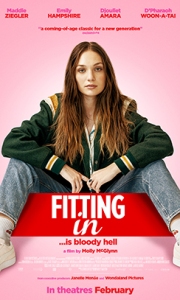 have conventional intercourse with her boyfriend. She’s facing a crisis but is terrified of telling anyone about it. Can her doctor’s gruelling regimen allow her to return to “normalcy”? And will she ever fit in with heteronormative standards?
have conventional intercourse with her boyfriend. She’s facing a crisis but is terrified of telling anyone about it. Can her doctor’s gruelling regimen allow her to return to “normalcy”? And will she ever fit in with heteronormative standards?
Fitting In is a funny, endearing and delightful new dramedy, a coming-of-age story about a teenaged girl learning to accept her body. It’s directed by award-winning filmmaker and writer Molly McGlynn, known for movies like Mary Goes Round, and TV shows including Working Moms and Grown-ish.
I spoke with Molly McGlynn in person at #TIFF23.
Fitting In opens in Canada on February 2nd.
Women at work. Films reviewed: I.S.S., Memory, The Teachers’ Lounge
Hi, this is Daniel Garber at the Movies for culturalmining.com and CIUT 89.5 FM.
In traditional movies (and even contemporary ones) men are typically portrayed at work with women at home. But that’s not real life for most people. So this week I’m looking at three new movies about women around the world at work. There’s a social worker in New York who meets a man with dementia; a teacher in Germany with a rebellious student; and an astronaut in space interacting with cosmonauts.
 I.S.S.
I.S.S.
Dir: Gabriela Cowperthwaite (review: Our Friend)
It’s present day in the thermosphere. Kira (Ariana DeBose) is a biologist on board the international space station, manned equally by Russians and Americans, an example of world peace, scientific cooperation and mutual respect. It’s her first day in space, and she feels weird and queazy living without gravity. She does love the cake and vodka, though. The space station has a ramshackle feel to it, with exposed wires and old video screens, but gets used to it pretty soon.
She’s there to conduct experiments on mice, alongside her Russian counterpart Alexey (Pilou Asbæk). Also on board are Gordon (Chris Messina) a moustached astronaut, and Christian (John Gallagher Jr.) a US Air Force officer; and on the other team, the beautiful and glamorous cosmonaut Weronika (Masha Mashkova) and Nicolai (Costa Ronin), representing the Russian military. Gordon and Weronica — who seem especially close — are impressively bilingual, while the rest get by with broken English and Russian.
In honour of her first day in space, Kira’s teammates show her something very few people have ever seen: a view of the peaceful, blue planet without conflict or national boundaries. But everything changes a few days into her voyage, when communication breaks with earth and secret messages arrive to both teams: Since the US and Russia are in conflict on earth, they’re ordered to seize control of the space station…by any means necessary. What is really happening down there? Can international friendship override their planetary orders? Or is the space station doomed?
I.S.S. is a classic, smart, sci-fi space opera with a contemporary twist. The acting is not bad, though I had trouble distinguishing between the two Russian men who have similar builds, faces and brown beards. And at the beginning of this movie, the non-gravity scenes looked very fake. But after a few minutes everything looked normal again. I liked the taut structure of the film, the constant tension, and the shifting if alliances among the six players. The film also takes you out of the ship, into an unplanned and untethered journey in space. There’s even a guest appearance by the famed Canadarm, but this one was clunky and concrete and a little bit dangerous. With geopolitics as fragile as they are these days, this film’s themes seem especially appropriate. While there is some violence, ISS kept me interested the whole time.
 Memory
Memory
Wri/Dir: Michel Franco
(review: New Order)
Sylvia (Jessica Chastain) is a social worker in New York at a home for adults with mental disabilities. Sylvia goes to AA meetings regularly; she’s stayed totally dry since the year before her 13-year-old daughter Anna (Brooke Timber) was born. They occasionally spends time with Sylvia’s sister Olivia’s family (Merritt Wever), but she’s very protective; she doesn’t want Anna to start drinking, smoking or taking drugs with her cousins. One evening, heading home after a high school reunion, she notices a man looking at her. He follows her home from a distance and spends the night outside her door in the pouring rain. Who is he and what is their connection? His name is Saul (Peter Sarsgaard) and — according to the card he wears around his neck — his emergency contact is his brother Isaac (Josh Charles).
Sylvia painfully remembers Saul as part of a group of older boys who sexual abused her when she was still in Junior High. It was one of a number of incidents that drove her to the alcoholism and depression she still carries with her. She agrees to meet him in the park so she can make him answer for his crimes. But to her chagrin she learns he has severe memory loss caused by early-onset dementia. She also  discovers — through a third party — that he could’t have attacked her; he hadn’t even moved to that area yet when the incidents she remembers took place.
discovers — through a third party — that he could’t have attacked her; he hadn’t even moved to that area yet when the incidents she remembers took place.
Later, Isaac hires her as a part-time caregiver — he says Saul never stops talking about her. She’s just supposed to keep him company in his home and make sure he doesn’t wander away. This puts them in a strange situation. He clearly likes her… but does she have feelings for him? And what will happen if their relationship changes from caregiver/patient to lovers?
Memory is a terrific drama about two troubled adults learning to understand each other despite their own deficits. It’s filled with shocking plot turns and secret revelations that totally change your perception as it goes. But through it all, the heart and warmth of the main characters always comes through. I wanted to see this because it’s by the fantastic Mexican filmmaker Michel Franco (the stunning New Order in 2020), but this one is totally different. While it also deals with issues of class, crime and family, it is as thoughtful and complex as New Order is hair-raising and revolting. Memory comes through as an unexpectedly powerful film while retaining a lightly playful and always unpredictable core.
Really interesting movie.
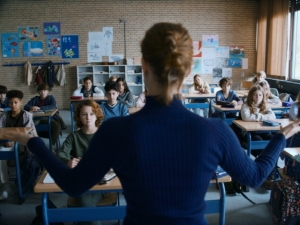 The Teachers Lounge
The Teachers Lounge
Co-Wri/Dir: Ilker Çatak
A public school in present-day Germany. Frau Nowak (Leonie Benesch) is a new, Grade 4 teacher, and her kids just love her. She has them instantly clapping twice when noise gets out of hand, and chanting answers to her when she poses daily questions. She does trust games, physical exercises and is always positive, but doesn’t let cheaters get away with it. She also encourages the kids to be creative in problem solving, especially, Oskar (Leonard Stettnisch), clearly the smartest kid in the class.
Between classes, she rests in the teachers’ lounge. But there’s trouble brewing. Someone is stealing cash from other kids’ wallets, and her students are forced — not by Frau Nowak — to point out potential suspects, who are pulled out of class by the admin. This leads to a feeling of distrust and tension. She thinks the problem isn’t with the kids, it’s with grownups — she sees teachers pilfering money from the coffee fund piggy bank. So one day she deliberately leaves her wallet in her jacket and steps out with her laptop set up to tape everything while she’s gone.
Sure enough, she notices some of her money is missing, and an arm (though no face) in a distinctive blouse is recorded reaching into her pocket. She privately confronts a woman wearing the same blouse that day and demands her money back. The woman Frau Kuhn (Eva Löbau) vehemently denies it. She’s a longtime staff who manages the school office, while Frau Nowak is a newcomer. The case goes to the principal’s office and Frau Kuhn is put on leave. The problem is, Oskar — the top student — is Frau Kuhn’s son. And he demands Frau Nowak publicly apologize for lying about her mom — or she’ll regret it. The news goes viral among the students, staff and even the parents, till it spirals out of control. Can this problem ever be resolved? Who, if anyone needs to apologize? And what will happen if they don’t?
regret it. The news goes viral among the students, staff and even the parents, till it spirals out of control. Can this problem ever be resolved? Who, if anyone needs to apologize? And what will happen if they don’t?
The Teachers’ Lounge is a fantastic drama that explores school life from a dozen angles. While the story is told from Frau Nowak’s point of view, it brings in tons of distinct characters, from the kids in her class, to the journalists at the school paper, to the complaining parents, the gossipy teachers, the bullies, the teachers pets, and the ordinary students just trying to fit in. Leonie Benesch is amazing as Frau Nowak, as she struggles to maintain control while doing the right thing as she sees it, even as she sees her students’ trust crumbling around here. This is a realy great movie, deep, realistic, moving and really well-acted. It’s Germany’s entry as best foreign language film at the Oscars, and I can see why.
Excellent movie.
Memory, I.S.S., and The Teachers’ Lounge all open this weekend in Toronto; check your local listings. And for some great new Canadian films, shorts and docs, be sure to check out the Milton Film Festival next weekend, January 26-28 at the FirstOntario Arts Center, in Milton.
This is Daniel Garber at the Movies, each Saturday morning, on CIUT 89.5 FM and on my website culturalmining.com.
Family movies worth watching. Films reviewed: The Boy and the Heron, The Three Musketeers: d’Artagnan
Hi, this is Daniel Garber at the Movies for culturalmining.com and CIUT 89.5 FM.
With the holidays upon us and lots of families getting together, it’s hard to find movies that interest kids without boring adults. But this week, I’m looking at two new movies — from Japan and France — that families can actually enjoy together, and without any product placement whatsoever. There’s a boy in 1940s Japan searching for his mother, and a young swordsman in 1620s France looking for adventure.
 The Boy and the Heron
The Boy and the Heron
Wri/Dir: Hayao Miyazaki
It’s 1943 in Japan, during WWII. Mahito is a teenaged schoolboy who recently moved away from Tokyo with his dad after his mother died, into a huge country house where his aunt Natsuko (his mom’s younger sister) lives. He is troubled by the fact his father has married Natsuko — who looks very much like his mother — and treats her almost as if they’re the same person . The house sits near a placid pond by a crumbling stone tower. Aside from his aunt, there is a bevy of old biddies who work on the estate. Mahito feels lost and abandoned and is bullied at school. One day on the way home he hits himself in the head with a rock, to make it look like he was attacked at school. Now bedridden, he  recovers in his new home, disturbed only by an enormous heron who taps at the glass of his window. But things take a strange turn when he is lured on a journey to the old tower by the heron, who it turns out… can talk! The Heron says if Mahito is looking for his mother, the he knows where to look. Chased by Kiriko, one of the elderly maids, he decides to enter the tower to see what’s what.
recovers in his new home, disturbed only by an enormous heron who taps at the glass of his window. But things take a strange turn when he is lured on a journey to the old tower by the heron, who it turns out… can talk! The Heron says if Mahito is looking for his mother, the he knows where to look. Chased by Kiriko, one of the elderly maids, he decides to enter the tower to see what’s what.
From there, he finds himself in a new universe, completely unlike anything he’s seen before. It’s a place where people and ghosts, the living and the dead, coexist. There are talking animals, including giant, fascistic parakeets marching under the sway of a military dictator. He joins forces with a brave and strong sailor, a young woman who looks somehow familiar to him. And tiny, floating bubble-creatures known as warawara, who  can cross to the real world from this other world. Can Mahito survive the dangers that await him? Can he rescue his mother and take her back home? Or will he be trapped there forever?
can cross to the real world from this other world. Can Mahito survive the dangers that await him? Can he rescue his mother and take her back home? Or will he be trapped there forever?
The Boy and the Heron is a brilliant animated story about a boy who visits a strange otherworld. It’s surreal and psychedelic. It deals with concepts like birth and death, reincarnation, souls, spirits, ghosts and gods, all situated within an authoritarian wartime Japan. It’s the work of Hayao Miyazaki’s Ghibli Studios, and is partially based on his own childhood. A master animated filmmaker, Miyazaki supposedly retired about a decade ago, but apparently never stopped drawing, and this is the result: an amazing burst of creativity and imagination. The Boy and The Heron is a beautiful — and sometimes heartbreaking — movie.
I recommend this one.
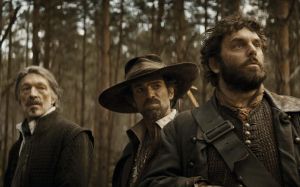
© 2023 CHAPTER 2/PATHE FILMS/M6 FILMS
LES TROIS MOUSQUETAIRES : D’ARTAGNAN
réal. : Martin Bourboulon. int. : François Civil, Vincent Cassel, Romain Duris, Pio Marmaï, Eva Green, Louis Garrel, Vicky Krieps, Lhyna Khoudri, Jacob Fortune-Lloyd, Marc Barbé, Patrick Mille, Julien Frison (de la Comédie-Française), Raph Amoussou.
pays : France. durée : 2 h 02. dist. : Pathé
Sortie en salle le 5 avril 2023
The Three Musketeers: D’Artagnan
Dir: Martin Bourboulon
It’s the 1620s in France. Charles d’Artagnan (François Civil) is a brash young man from Gascony travelling on horseback to Paris. He wants to join the famed musketeers, an elite force serving under Louis XIII (Louis Garrel). On the way he witnesses a crime involving a stage coach, a sealed letter, and a mysterious woman in a black-hooded cape. When he comes to the rescue of a besieged woman in the coach, she shoots him! He is buried alive, but that doesn’t stop him. He makes his way to the palace, looking worse for the wear, and manages to sneak in to present his credentials. However, though a fine fighter, he can be both clumsy and arrogant and somehow offends three separate men, each of whom challenges him to a duel. He shows up at the assigned hour, prepared to die. Turns out the three men all know each other: Athos (Vincent Cassel) Porthos (Pio Marmaï) and Aramis (Romain Duris) all widely known for their sword skills and lusty habits. But before the duels can begin they are accosted by a small army of soldiers, working for Cardinal Richelieu. All for one they say, and d’Artagnan joins them in the fight, soon proving his  mettle. The three men are of course, the Three Musketeers.
mettle. The three men are of course, the Three Musketeers.
Now, having been invited to join the cadets, but not the elite musketeer corps, d’Artagnan moves into an apartment near Constance (Lyna Khoudri) — a personal confident of the queen— whom he fell in love with at first sight. But trouble is brewing. The King’s brother (along with Cardinal Richelieu) is plotting to send the country to war with the Protestants — meaning, England. The Queen (Vicky Krieps) is romantically involved with the Duke of Buckingham. Athos is accused of murder but says he has no recollection of the night’s events (he was drunk, as usual). And the Queen — who rashly gave a diamond necklace to Buckingham as a keepsake — is ordered by the king to wear it at an upcoming ball. And of course there’s the mysterious Milady (Eva Green) who seems to be involved in all the intrigue swirling around the palace. Can they rescue the necklace, stop Athos’s execution, uncover a secret plot and prevent an upcoming war? And will d’Artagnan ever be accepted by the Three Musketeers?
The Three Musketeers is, of course, the latest version of the classic swashbuckler based on the novel by Alexandre Dumas. It’s a Hollywood perennial; they release countless versions of this film, usually once a decade, stretching back to silent movies, featuring stars like Douglas Fairbanks and Adolph Menjou, Gene Kelly and Lana Turner, Raquel Welch and  Oliver Reed, Charlie Sheen and Keifer Sutherland. And these are just the Hollywood ones; there also have been many French versions, like this one, plus Mexican, Japanese, Italian… you name it. The story has action, intrigue, adventures, romance and comedy. So how does this one stand up?
Oliver Reed, Charlie Sheen and Keifer Sutherland. And these are just the Hollywood ones; there also have been many French versions, like this one, plus Mexican, Japanese, Italian… you name it. The story has action, intrigue, adventures, romance and comedy. So how does this one stand up?
I found it very enjoyable, sticking close to the original book, but with enough new or unfamiliar parts to keep you guessing. Less “bodice-ripping,” more fighting. In this version, the musketeers actually use their muskets — so there are gun fights, not just sword fights. Porthos is polysexual — he’ll sleep with anyone that movies. And this d’Artagnan is dirtier, poorer and scruffier than usual, but the actor (François Civil) does have electric appeal. There are horseback chase scenes, masked balls, overheard plot turns and daring escapes — I love this stuff. It’s shot among lush forests, cliff-side beaches, in crowded marketplaces or dark palace corridors. Warning: this is part one of two films, and leaves you with a bit of a cliff-hanger.
Personally, I think Richard Lester’s 1973 version is the best, but this one definitely holds its own.
The Boy and the Heron and The Three Musketeers, Part 1: D’Artagnan are both playing now at select theatres across Canada; check your local listings.
This is Daniel Garber at the Movies, each Saturday morning, on CIUT 89.5 FM and on my website, culturalmining.
Films reviewed: Orlando: My Political Biography, Fallen Leaves
Hi, this is Daniel Garber at the Movies for culturalmining.com and CIUT 89.5 FM.
Toronto’s Fall film festival season continues in December with the Jayu Human Rights film festival showing insightful documentaries on pertinent issues, along with a slam poetry competition at the Ace Hotel.
But this week, I’m looking at two new European movies that played at TIFF this year and are now in cinemas. There are trans shape-shifters in France and lonely job-seekers in Finland.
 Orlando: My Political Biography
Orlando: My Political Biography
Wri/Dir: Paul B. Preciado
It’s 17th century, Elizabethan England. Orlando is a teenaged boy, a handsome courtier in the Queen’s castle. He’s also an aspiring writer, waxing lyrical on oak trees and winter frosts. He falls in love with Sasha, a blonde, Russian aristocrat. But at the age of 30, he wakes from a deep sleep transformed into a woman. Orlando’s life takes her (and him) through various guises over hundreds of years, to capitals as far away as Constantinople, until finally returning by ship to 20th century London, where they finally complete and publish their book. Such is the “biography” of Orlando in Virginia Woolf’s famous novel. So what’s different about this film?
For one thing, the entire cast is trans or non-binary, as is Preciado, the director. And the cast is huge. Each version of Orlando is played by another actor, their sex, gender and sexuality presented in a myriad of ways. Orlando is plural in this incarnation. Not just that, Orlando’s race, colour and language also shifts, with the actors ages ranging from small children to the elderly. Some characters wear chainmail like Joan of Arc, while others recline, luxuriantly, in an Ottoman seraglio. The one common factor is their Elizabethan white  neck ruffs, the fashion of the day.
neck ruffs, the fashion of the day.
Orlando, My Political Biography is not the first film version of the novel — far from it. It seems to attract the most experimental and avant garde filmmakers out there. German director Ulrike Ottinger made Freak Orlando in 1981 which entirely rejects the conventions of both narrative and art movies. English director Sally Potter (see: The Roads Not Taken, The Party, Ginger and Rosa)’s Orlando of 1992 starred Tilda Swinton as the various Orlandos and featured Jimmy Sommerville singing up in a tree.
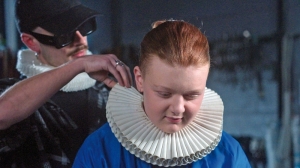 But this French political biography adopts Bertolt Brecht’s (and Jean-Luc Godard’s) method of deliberately alienating the audience to promote a political stand. Each Orlando introduces their scene by announcing directly to the camera their real /adopted name and personal history, followed by their Orlando passage, often reading directly from a copy of Woolf’s book. But it remains engaging because of the beauty of the photography and costumes and the sincerity of the players in the film. Settings vary from deliberately artificial backdrops to an exquisite forest and a grotesque Parisian catacomb.
But this French political biography adopts Bertolt Brecht’s (and Jean-Luc Godard’s) method of deliberately alienating the audience to promote a political stand. Each Orlando introduces their scene by announcing directly to the camera their real /adopted name and personal history, followed by their Orlando passage, often reading directly from a copy of Woolf’s book. But it remains engaging because of the beauty of the photography and costumes and the sincerity of the players in the film. Settings vary from deliberately artificial backdrops to an exquisite forest and a grotesque Parisian catacomb.
The political stance is complex, and involves a rejection of the accepted binary. Some take issue with psychiatrists, surgeons and pharmacists having control of their identities and bodies.  Says one young Orlando: you must hate your genitals if you want the doctor to give you hormones… but I don’t hate my genitals. Says another: I adopted a ridiculous caricature of masculinity for a year after transitioning before realizing I shouldn’t erase my personal history just because I’m trans.
Says one young Orlando: you must hate your genitals if you want the doctor to give you hormones… but I don’t hate my genitals. Says another: I adopted a ridiculous caricature of masculinity for a year after transitioning before realizing I shouldn’t erase my personal history just because I’m trans.
Orlando, My Political Biography is equal parts intellectual lecture, political diatribe, performance art, and cinematic experiment, and, most surprisingly… it works.
 Fallen Leaves
Fallen Leaves
Wri/Dir: Aki Kaurismaki
It’s typical day in Helsinki, Finland.
Ansa (Alma Pöysti), a single woman in her thirties, works at a low-paying job in a supermarket. She lives in a small apartment and subsists on frozen microwave dinners. She likes listening to relaxing music, but her bakelite radio only plays bad news from the Ukrainian war these days. She does go out occasionally to a local karaoke bar, with her best friend Liisa (Nuppu Koivu). There she encounters — but doesn’t actually meet — Holappa (Jussi Vatanen). Holappa is a depressed guy who works as a welder at a small factory. He lives in the company dorm, along with acquaintances and his best friend and confident Huotari (Janne Hyytiäinen). He handles his depression with constant drinking, which only gets him more depressed. After a few near misses they finally meet face to face. Their first date? A zombie movie at a local rep cinema. Sparks fly and they vow to meet again soon. But various unfortunate coincidences seem destined to keep these soulmates far apart. Can they ever find happiness together? Or is this a relationship that can never happen?
Fallen Leaves is a tragicomic proletarian love story par  excellence. Its also a deadpan comedy, which despite it’s nearly tragic atmosphere, will have you laughing and crying all the way through. If you’ve ever seen an Aki Kaurismaki movie before you’ll instantly recognize his style: seedy bars, bearded bikers, dark rock n roll, and a noir-ish, retro feel. Similar to Jim Jarmusch, but much funnier. It also deals with real-life issues like alcoholism and poverty. Ansa loses her job for taking home an expired cookie instead of throwing it away, while Holappa is driven close to self- destruction by his constant boozing. If you haven’t seen his movies before, Fallen Leaves is a great one to start.
excellence. Its also a deadpan comedy, which despite it’s nearly tragic atmosphere, will have you laughing and crying all the way through. If you’ve ever seen an Aki Kaurismaki movie before you’ll instantly recognize his style: seedy bars, bearded bikers, dark rock n roll, and a noir-ish, retro feel. Similar to Jim Jarmusch, but much funnier. It also deals with real-life issues like alcoholism and poverty. Ansa loses her job for taking home an expired cookie instead of throwing it away, while Holappa is driven close to self- destruction by his constant boozing. If you haven’t seen his movies before, Fallen Leaves is a great one to start.
Everything in this film is retro. Finland is the high-tech home of Nokia and Supercell, but in Kaurismaki’s world the characters use avocado coloured landlines, with cel phones or video games 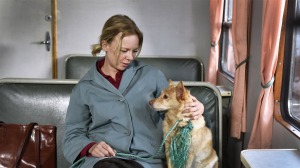 nowhere to be seen. Computers seem relegated to internet cafes. Phone numbers are written on slips of paper, blown away with the wind. Movie theatres only play classics, and every bar is on skid row.
nowhere to be seen. Computers seem relegated to internet cafes. Phone numbers are written on slips of paper, blown away with the wind. Movie theatres only play classics, and every bar is on skid row.
At the same time, there’s always a niceness and sweetness burbling just below the surface of the humdrum futility of everyday life. Fallen Leaves is a wonderfully depressing movie with a feel-good atmosphere. I love this movie.
Fallen Leaves and Orlando My Political Biography are both playing now at the TIFF Bell Lightbox, and at other theatres across Canada — check your local listings.
This is Daniel Garber at the Movies, each Saturday morning, on CIUT 89.5 FM and on my website culturalmining.com.
Daniel Garber talks with Jeff Harris about #TIFF23!

PART 1
(13m 51s)
Films discussed include: Woman of the Hour, Poolman, Gonzo Girl, Dream Scenario, Dicks the Musical, Zone of Interest, The Holdovers, and more…

PART 2
(15m 04s)
Films discussed include: Fingernails, Hitman, Green Border, Wicked Little Letters, Breaking Ice, Perfect Days, and more…
Hi, this is Daniel Garber at the Movies for culturalmining.com and CIUT 89.5 FM.
#TIFF23 brought us a different festival than any we’ve seen before. Hollywood actors and writers were on strike, with release dates still uncertain. Geopolitics cut many countries off the usual lists. And some filmmakers who usually send movies were still recovering from the lethargy of COVID. But the movies — and I mean lots of them — were there, including tons of great ones.
So, to help me with a post- TIFF roundup and analysis, I’m very pleased to welcome back friend-of-the-show Jeff Harris. Jeff has covered TIFF for more than two decades, in photos and features for publications like
Macleans, The Walrus, and culturalmining. Jeff is also known for his photographic art — including an ongoing series of others taking pictures of him — which have won many prestigious awards.
We cover films we love, indies, turkeys, and some films that just aren’t getting enough coverage… plus noticeable changes at this year’s festival, and the whole TIFF experience.
I spoke with Jeff in person.
Photographs from TIFF 2023 by Jeff Harris

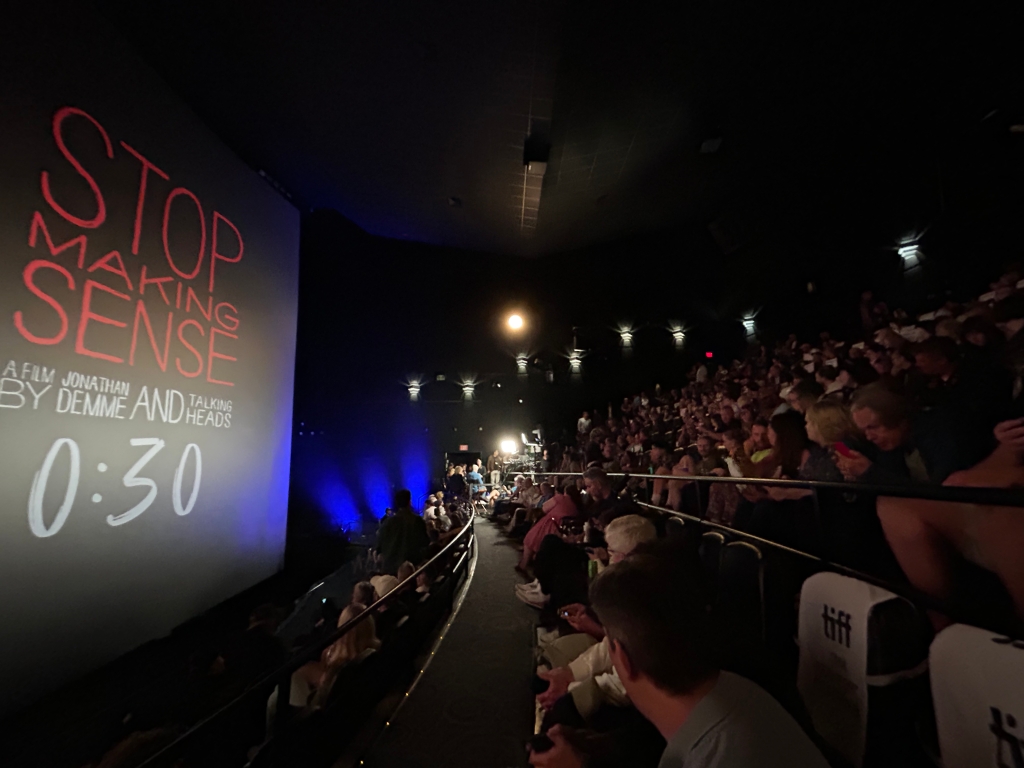


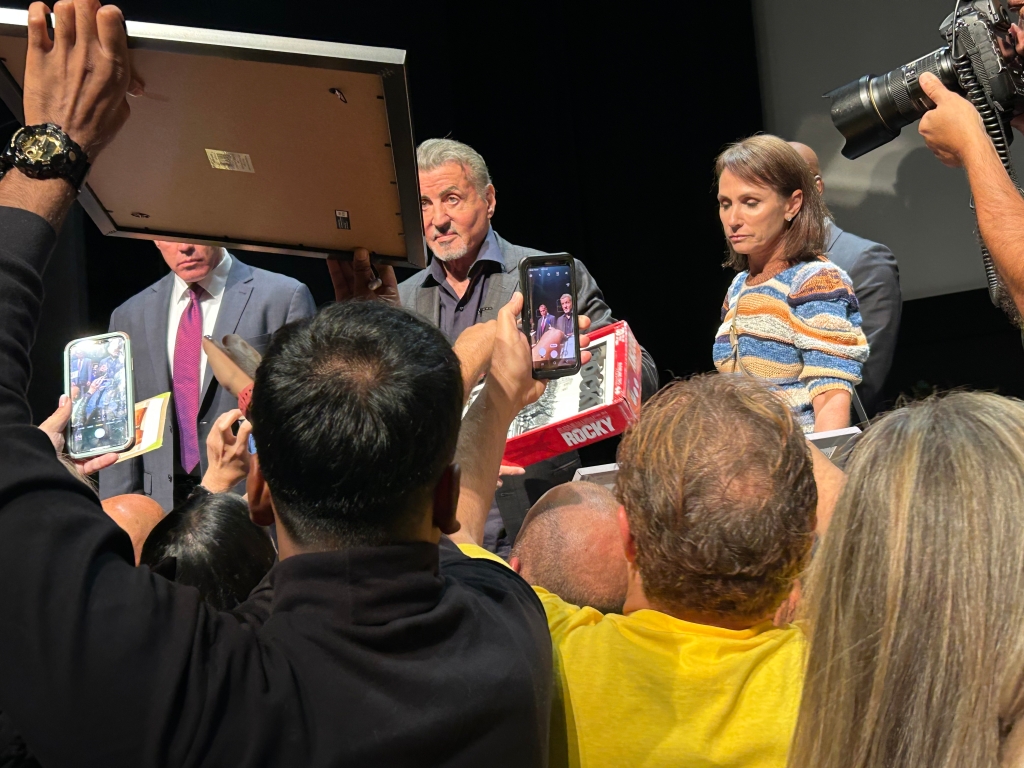

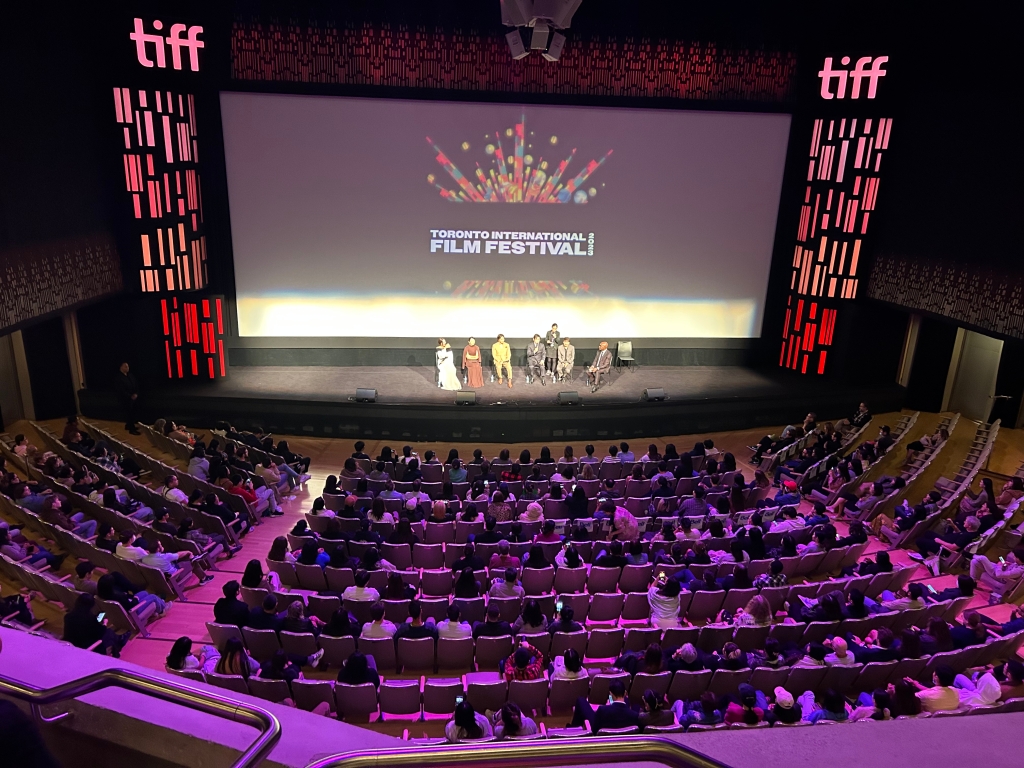
Magical kids. Films reviewed: The New Boy, Butterfly Tale, Once Within a Time
Hi, this is Daniel Garber at the Movies for culturalmining.com and CIUT 89.5 FM.
You’ve heard of Peter Pan, right? He’s most famous for not growing up and for believing in fairies. And it’s true, kids are more likely to believe in magic than grown ups. This week, I’m looking at three new movies about the innocence and magic of childhood. There’s a disabled, teenaged butterfly that wants to migrate with his flock; an indigenous boy with magical powers sent to a church-run school; and a group of kids forced to face a fairytale apocalypse.
 The New Boy
The New Boy
Wri/Dir: Warwick Thornton (Sweet Country)
It’s the 1940s at a remote Australian Benedictine monastery. Sister Eileen (Kate Blanchett) is excited because there’s a new student arriving soon. She runs the place, ever since the head Benedictine monk died — she keeps this detail a secret from the outside world. The new boy (Aswan Reid) is indigenous, can’t speak English, and has had virtually no contact with white Australia. He has blond hair and brown skin. He sleeps on the floor, not on a bed, and finds forks and spoons a mystery. At the same time, he can conjure up glowing particles to light his way, using just his hands. And he has magical powers: he can speak to trees, and cures people bitten by poisonous snakes.
The sisters teach him out to use an outhouse (which he finds both funny and revolting), and about western ways and foods. Above all, Sister Eileen wants to convert him to Christianity — she lives him deeply, and wants to save his soul. She uses a life-sized wooden statue of Jesus writhing on the cross as the catalyst. She hopes to change him completely, and ultimately to baptize him and give him a Christian name. Will he convert? And what will happen if he does?
The New Boy is a gentle, bittersweet look at religion, colonization, forced assimilation and residential schools (known as boarding schools in Australia), as seen through one boy’s eyes. I found it both inspiring and tragic. Kate Blanchett is wonderful as the scheming but good-hearted nun, while young actor Aswan Reid is remarkable as the unnamed new boy. (The movie opens with a violent fight between him and a soldier in the bush, just one of many surprising scenes he manages to convey without uttering a single word.) Director Warwick Thornton based it partly on his own experiences as a boy in Alice Springs, and those personal details and feelings come through.
colonization, forced assimilation and residential schools (known as boarding schools in Australia), as seen through one boy’s eyes. I found it both inspiring and tragic. Kate Blanchett is wonderful as the scheming but good-hearted nun, while young actor Aswan Reid is remarkable as the unnamed new boy. (The movie opens with a violent fight between him and a soldier in the bush, just one of many surprising scenes he manages to convey without uttering a single word.) Director Warwick Thornton based it partly on his own experiences as a boy in Alice Springs, and those personal details and feelings come through.
I liked The New Boy a lot.
 Butterfly Tale
Butterfly Tale
Dir: Sophie Roy
Patrick (Mena Massoud) is a young monarch butterfly who recently made the transition from caterpillar. He and his best friend Marty are looking forward to joining his village on their annual migration to Mexico. He is especially excited about spending quality time with the girl he’s crushing on, Jennifer (Tatiana Maslany). But there’s a problem. Patrick emerged from his cocoon with mismatched wings, so he’s disabled and can’t fly. And Marty is still a caterpillar. They are teased and bullied by the bigger butterflies as “butter fails”.
Worse still, Patrick’s mom, a leading flier in the “flutter” (what they call their butterfly community) wants him to stay home in the winter. But Patrick and Marty are determined to get there by hook or by crook. Jennifer, a strong flier, is pulling a leaf filled with milkweed so they can all eat on the way. Patric and Marty stowaway aboard that leaf! Little did they know they’ll face tornadoes, big box stores and angry birds posing life threatening dangers on the way. Will Patrick ever learn to fly? Will Marty ever make the transition from caterpillar to butterfly? And will Jennifer get over her hangups?
Butterfly Tale is an animated, coming-of-age road movie  about anthropomorphic butterflies. They’re basically people, with human hair, faces, and bodies but with big butterfly wings coming out of their backs. They wear T-shirts and hoodies, and worry about adolescent insecurities. (They even have to stop the flight along the way to take a leak.) Little kids might really identify with the characters and like this movie; it has good role models for children with disabilities, and deals with environmental issues. The thing is, it’s not original or funny or risky or challenging anywhere, just a typical adolescent drama, where the people happen to be butterflies. I’m not saying it was uninteresting — it kept my attention the whole time — there just wasn’t much to it.
about anthropomorphic butterflies. They’re basically people, with human hair, faces, and bodies but with big butterfly wings coming out of their backs. They wear T-shirts and hoodies, and worry about adolescent insecurities. (They even have to stop the flight along the way to take a leak.) Little kids might really identify with the characters and like this movie; it has good role models for children with disabilities, and deals with environmental issues. The thing is, it’s not original or funny or risky or challenging anywhere, just a typical adolescent drama, where the people happen to be butterflies. I’m not saying it was uninteresting — it kept my attention the whole time — there just wasn’t much to it.
 Once Within a Time
Once Within a Time
Wri/Dir: Godfrey Reggio
Once upon a time, a bunch of happy kids follow the beckoning voice of a goddess onto a stage. After riding a merry-go-round they start to notice strange happenings. An Adam-and-Eve-like young couple in wire masks take a piece of fruit from a sinister looking apple-man, unleashing terrible events. Smart phones generate robots, a chimp in a monkey suit and another in a VR helmet, huge industrial power-towers, a baobab tree exploding into a mushroom cloud. Ecological and geopolitical devastation is at hand! Can we survive the end of this world… or maybe start a new one?
Once Within a Time is a phantasmagorical, magic-lantern fable performed on a two dimensional stage beneath a prominent proscenium arch. It’s equal parts live-action, documentary 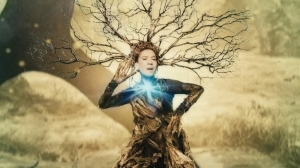 footage, still images, and 3-D stop-motion animation.
footage, still images, and 3-D stop-motion animation.
I first saw Godfrey Reggio’s Koyaanasqatsi as a teenager and the barrage of apocalyptic images of corporate uniformity combined with Philip Glass’s pounding music left deep marks in my psyche. This one is kinder and gentler but still effective. It’s co-directed and edited by Jon Kane with amazing vintage special affects from irises to rear projections to dual spectroscope photos. There are tinted black & white shots, shadow puppets, grotesque masks, and dancing robots  that evoke everything from Georges Méliès to Guy Maddin to the late Peewee Herman’s Playhouse. Who knew the apocalypse could be so beautiful? It’s less than an hour in length, but provides about three times that in intensity. If you can, see it on a big screen and just let the images and music overwhelm you.
that evoke everything from Georges Méliès to Guy Maddin to the late Peewee Herman’s Playhouse. Who knew the apocalypse could be so beautiful? It’s less than an hour in length, but provides about three times that in intensity. If you can, see it on a big screen and just let the images and music overwhelm you.
Great movie.
Butterfly Tale is now playing in Toronto; check your local listings. The New Boy is a feature at the ImagineNative film festival starting next week. And Once Within a Time is playing tomorrow (Sunday, October 15th, at 5 pm) at the TIFF Bell Lightbox.
This is Daniel Garber at the Movies, each Saturday morning, on CIUT 89.5 FM and on my website, culturalmining.com.
Daniel Garber talks with Kitty Green about The Royal Hotel at #TIFF23

Hi, this is Daniel Garber at the Movies for culturalmining.com and CIUT 89.5 FM.
Photograph by Jeff Harris
Hanna and Liv are two American friends in Sydney, Australia, living it up on their work/study visas. But when their money runs out they realize its time to get a job. They land one at a pub in a remote mining town called The Royal Hotel. But Royal it ain’t. It’s a ramshackle enterprise, run by an alcoholic who never pays his workers, and is patronized by rude and rowdy miners, almost all male. There’s no wifi and nothing to do. And as the tension grows, Hanna and Liv wonder if the men around them are just boisterous… or potentially dangerous. And how long can they survive in this dingy pit of misogyny, dirt and snakes?

The Royal Hotel is a new Australian film about two women surviving in the Australian outback. It’s the work of award-winning Australian filmmaker Kitty Green, know for her feminist take on a range of issues from protests to workplace harassment in film like The Assistant. The Royal Hotel had its Canadian Premiere at TIFF. I last spoke with Kitty a decade ago at CIUT about her documentary Ukraine is not a Brothel .
I interviewed Kitty on site and in person at #TIFF23.
The Royal Hotel opens in Canada this weekend.
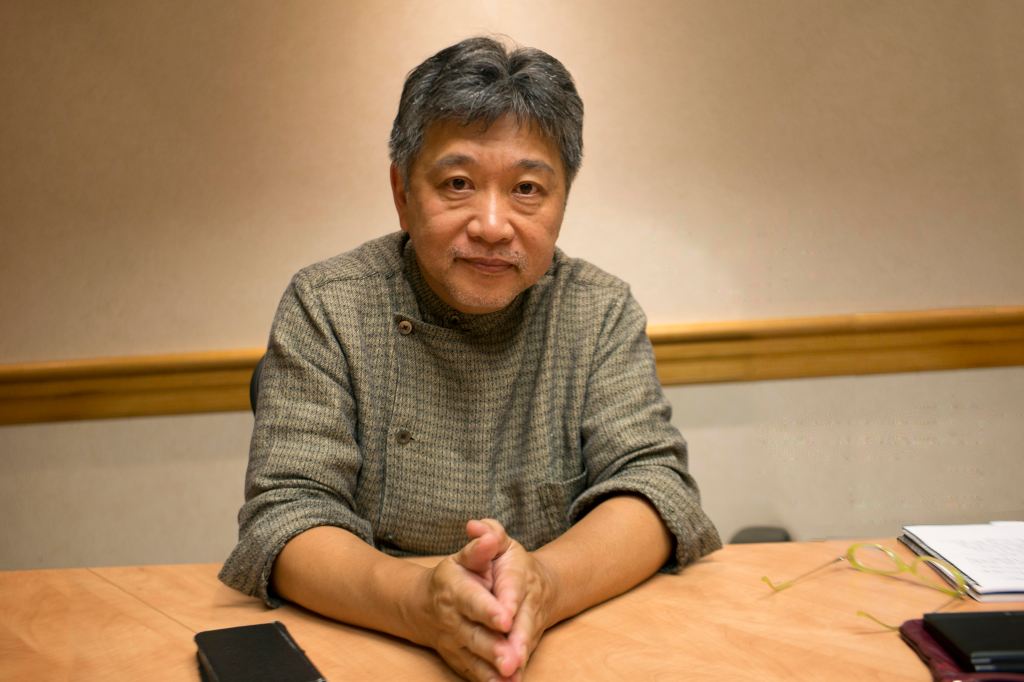

leave a comment